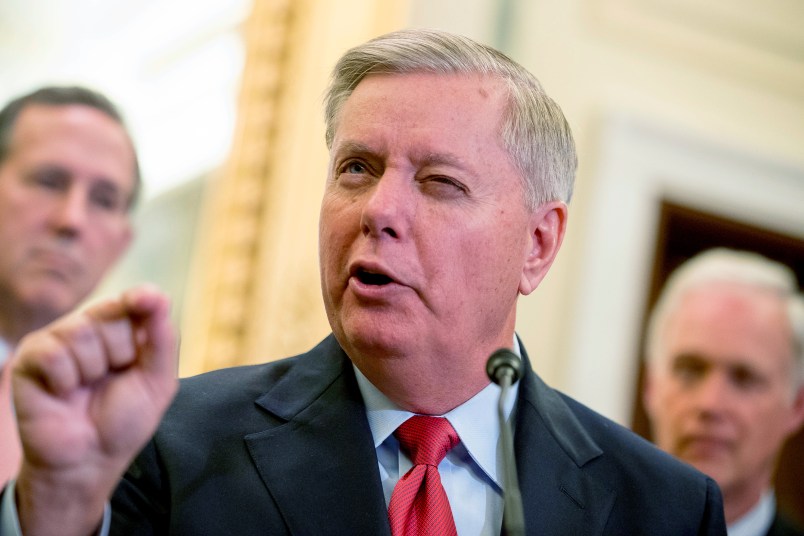They’re close, but close only counts in horseshoes and hand grenades.
With less than two weeks left on the clock to repeal Obamacare with only 50 votes, Senate Republicans are still scrambling to win over several wavering members of the GOP caucus. A rushed, incomplete score from the Congressional Budget Office and doubts expressed by some Democratic and Republican governors and House lawmakers have made senators still more wary of the bill currently on the table, which would repeal much of Obamacare and convert Medicaid funding into a shrinking block grant.
Despite a flurry of lobbying and arm-twisting, a sizable handful of Republicans—including Sens. Rand Paul (R-KY), Susan Collins (R-ME), John McCain (R-AZ), Lisa Murkowski (R-AK), Dan Sullivan (R-AK), Shelley Moore Capito (R-WV) and Cory Gardner (R-CO)—say they’re not ready to support the bill, citing serious concerns both with the legislation’s process and substance. Still other senators have not publicly disclosed where they stand, and we could easily see a repeat of the last-minute surprise defections that occurred in the lead-up to the Senate’s previous repeal vote.
Whether enough of these lawmakers will fall in line to hold a vote or whether this Obamacare repeal bill will go the way of its predecessors will be decided in the coming days. So far, however, the holdouts are holding out.
Even after his governor—Doug Ducey (R-AZ) threw his weight behind the effort on Monday, McCain was not yet ready to give his blessing to the bill drafted by his closest Senate friend and ally, Lindsey Graham (R-SC).
“I want to go through regular order and make sure we have amendments, we have debate,” McCain told reporters Monday night. “I’m also looking at the bill itself.”
Whether McCain will be placated by the fulsome 90 seconds of debate time left on the Senate’s clock is unclear.
Collins, who joined with McCain in July to vote down a different Obamacare repeal bill, sounded like an even harder no on Monday night, telling reporters that the process has been “short-circuited” and “problematic.”
“I’m concerned about what the effect would be on coverage, on Medicaid spending in my state, on premiums, particular for older Americans, and on the fundamental changes in Medicaid without the senate holding a single hearing to evaluate them,” she said.
In the absence of information from the federal government about what the bill would do to people on the ground, Collins has turned to local sources, and is not liking what she is hearing. “I will tell you that the Maine Hospital Association has calculated that Maine would receive a billion dollars less in Medicaid and other federal health care spending in the next decade,” she said. “That’s obviously of great concern.”
Murkowski, the other senator who helped tank the previous repeal effort, has said she is still evaluating the impact of the proposal on her state. On Tuesday, her governor came out against the plan, giving her the cover she would need to once again vote no. Her fellow Alaskan Sullivan, when asked Monday if he was “sold” on the merits of the bill, answered: “Not yet.”
From the opposite end of the caucus’ spectrum, Paul is excoriating the bill for not going far enough in fully repealing the structure and taxes of the ACA, blasting the proposal as “Obamacare-lite.”
And while most Republicans are falling over themselves in praising the bill for devolving health care decision-making and funding back to state governments, some have warned that allowing states to design their own systems could lead to … states designing their own systems.
“I like the idea of flexibility, but I don’t want states to be able to take the money and set up a single payer system,” Sen. John Kennedy (R-LA) told TPM. “I don’t believe in a single payer system. That’s precisely what California and New York and some other states would do.”
When TPM noted that progressive states would get tens of billions less in federal funding under the bill, making it extremely difficult to set up a generous single payer system, Kennedy was unmoved.
“It’s still a chunk of money,” he said. “We’re not talking chopped liver here.”
Kennedy has submitted amendments to the bill that would ban states from enacting single payer, but clarified Tuesday that he would likely vote for the bill even if those amendments are not adopted.
Despite these disagreements, GOP leadership is delighted that in just a few short weeks, the push to repeal Obamacare has gone from being completely written off to being alive and kicking and sending progressive health care groups into panic mode.
“I call [bill co-author Bill Cassidy] the grave robber,” Sen. John Thune (R-SD) told reporters. “This thing was six feet under. Now there’s a lot of buzz and momentum, but it still comes down to getting 50 votes.”







What was that definition of insanity again?
Well this isn’t governing this is terrorism … keep throwing grenades they can’t catch all of them sooner or later one will land or if at first you don’t succeed try try again and again and again and again. Pass it and you own it GOP.
“close only counts in horseshoes and hand grenades.”
And, shudder, nuclear war.
I heard the Chuck Schumer is threatening to derail must-pass legislation to keep the Republicans from killing thousands of Americans (and legal immigrants). I hope that’s true, that he can do it and that he will keep his nerve. Republicans don’t fight fair. Why should Democrats, when there are people’s lives at stake?
From the photo, it looks like one of the pirates forgot to wear his eye-patch this morning.
…and yes, today is Talk Like A Pirate Day
So, what is a pirates favorite letter?
… tax cuts for the rich…
You’re not ‘taking the hill’ if you’re walking over nothing but scorched earth.